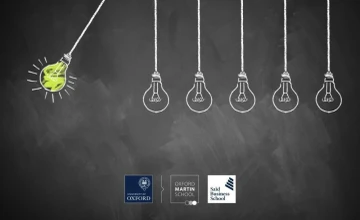Past
Events
Recent Events
February
Panel Discussion: 'Measuring what matters: biodiversity metrics for business and finance'
10th February 2026: 5:00pm
Registration Required
Live Stream
Oxford Martin School & Online
This panel discussion will explore how biodiversity science can better inform decisions in business, finance, government and other bodies.
January
'Biodiversity, ecosystem services and sustainability: is it time for a reset?' with David Obura
28th January 2026: 5:00pm
Registration Required
Live Stream
Oxford Martin School & Online
This talk will build on findings from recent assessments of the Intergovernmental Platform on Biodiversity and Ecosystem Services (IPBES) and other platforms to explore the transformations needed, and linkages across sectors and countries, to respond to multiplying disruptions across the globe. David Obura will present some provocations to explore the underlying causes of challenges to sustainability today, and emerging perspectives to build new solutions for the multiple intersecting crises across nature, economy, society and governance.
Panel Discussion: 'COP30 Debrief: Insights and reflections from the University of Oxford delegation'
27th January 2026: 12:30pm
Registration Required
Live Stream
Oxford Martin School & Online
Join the Oxford Climate Research Network and the Oxford Martin School for a debrief panel unpacking the key outcomes and implications of COP30, with insights from members of the Oxford delegation.
'The (missing) third pillar: why climate policy needs to get serious about carbon management' with Prof Ottmar Edenhofer
22nd January 2026: 5:00pm
Registration Required
Live Stream
Oxford Martin School & Online
Professor Ottmar Edenhofer will examine why large-scale carbon dioxide removal (CDR) is essential for meeting climate targets and establishing a third pillar of climate policy alongside abatement and adaptation.
December
'In Trump's world, is there room for multilateralism?' with Lord Malloch-Brown
4th December 2025: 5:00pm
Registration Required
Live Stream
Oxford Martin School & Online
The last year has been marked by a dramatic turn away from multilateral cooperation towards the assertion of national interest. Many attribute this directly to the re-election of President Trump, and while he is the most prominent spokesman and catalyst for this change, the talk will trace how the US move away from multilateral cooperation began much earlier. This shift is also not limited to the US, as other countries also focus on the promotion of national interest over international solidarity.
'Integrating epilepsy into maternal health systems: lessons from Nepal and global insights' with Deepesha Silpakar
1st December 2025: 5:00pm
Registration Required
Live Stream
Oxford Martin School & Online
Epilepsy affects over 50 million people worldwide, yet women of reproductive age, particularly in low- and middle-income countries, continue to face multiple barriers to care during pregnancy. In Nepal, these challenges highlight the urgent need to integrate epilepsy into maternal and reproductive health systems to ensure safer pregnancies and better long-term outcomes.
November
Kim Darroch & Kathy Harvey in conversation: 'Navigating the chaos: Trump, Putin, the rise of populism and the end of the rules-based international order'
26th November 2025: 5:00pm
Registration Required
Live Stream
Oxford Martin School & Online
Kathy Harvey will be in conversation with Kim Darroch, former British Ambassador to the European Union, National Security Adviser and Ambassador to the United States, about the new disorder and its consequences for governments and businesses.
Series: Oxford Martin School and Saïd Business School Termly Events
'Adapting food systems to climate change: lessons from aquaculture in the Vietnamese Mekong Delta' with Dr Dao Minh Hai
25th November 2025: 12:30pm
Registration Required
Live Stream
Oxford Martin School & Online
The Mekong Delta, Vietnam's "rice bowl" and a globally significant biodiversity hotspot, is on the front line of climate change.
‘Globalisation, global change and emerging infectious diseases’ with Prof John Drake
18th November 2025: 5:00pm
Registration Required
Live Stream
Oxford Martin School & Online
In this Pandemic Sciences Institute & Oxford Martin School talk, Professor Drake will trace the historical record of major 20th and 21st Century pandemics, highlighting how global forces such as economic integration, urbanisation and climate disruption shape the emergence and spread of novel pathogens.
James Martin Memorial Lecture: 'Environment, health, society and economics in the new era of geopolitics' with Lord Hague
12th November 2025: 5:00pm
Registration Required
Live Stream
The Sheldonian Theatre and Online
We welcome the Chancellor of the University of Oxford, Lord Hague, who will give this year's James Martin Memorial Lecture on the occasion of the School's 20th anniversary.
Panel Discussion: 'The nature of post-Western order' with Prof Amitav Acharya
10th November 2025: 5:00pm
Registration Required
Live Stream
Oxford Martin School & Online
Join us for a roundtable discussion with Professor Amitav Acharya, Professor Faisal Devji, and Professor Andrew Hurrell, chaired by Professor Louise Fawcett.
Book talk - 'Portals to a New Reality' with Prof Vlatko Vedral
6th November 2025: 5:00pm
Registration Required
Live Stream
Oxford Martin School & Online
In his new book 'Portals to a New Reality', Prof Vlatko Vedral argues that we are on the brink of a new revolution in physics. In this talk, he will describe a number of key thought experiments that test the foundations of physics, namely the interface between quantum physics and general relativity.
'The energy transition: too little/too late or a new hope?' with Alan Haywood
5th November 2025: 5:00pm
Registration Required
Live Stream
Oxford Martin School & Online
With the impacts of climate change becoming ever more evident and challenging – can we “transition away from fossil fuels”, and create a new energy system which meets the many and divergent needs of the global population?
October
Book talk - 'Roadkill: Unveiling The True Cost Of Our Toxic Relationship With Cars' with Prof Henrietta Moore and Arthur Kay
30th October 2025: 5:00pm
Registration Required
Live Stream
Oxford Martin School & Online
Join Professor Dame Henrietta L. Moore and Arthur Kay for a provocative discussion on how our dependence on cars has shaped not only our cities and infrastructure, but our economies, health, and freedoms. Based on the ideas explored in their new work, this talk will interrogate the hidden costs of car-centric development and propose bold, systems-level alternatives to rethink how we move, live, and thrive in a climate-constrained world.
'Feeding the world while preserving earth's liveability: the biofuel barrier' with Prof David Tilman
22nd October 2025: 5:00pm
Registration Required
Live Stream
Oxford Martin School & Online
The two fastest-growing global uses of food crops are their conversion into biofuels and their use as livestock feeds. These trends are accelerating the risks of species extinctions, of agriculturally-driven climate change, and of agricultural water and air pollution. Biofuel production from food crops also directly decreases the availability of food for the world’s 700 million malnourished people, and may cause further harm to the world’s poor by impacting food prices.
Book talk - 'How Progress Ends: Technology, Innovation, And The Fate Of Nations' with Prof Carl Benedikt Frey
15th October 2025: 5:00pm
Registration Required
Live Stream
Oxford Martin School & Online
In How Progress Ends, Carl Benedikt Frey challenges the conventional belief that economic and technological progress is inevitable. For most of human history, stagnation was the norm, and even today progress and prosperity in the world’s largest, most advanced economies—the United States and China—have fallen short of expectations. To appreciate why we cannot depend on any AI-fueled great leap forward, Frey offers a remarkable and fascinating journey across the globe, spanning the past 1,000 years, to explain why some societies flourish and others fail in the wake of rapid technological change.
Keep in touch
If you found this page useful, sign up to our monthly digest of the latest news and events
Subscribe














